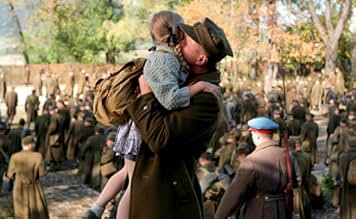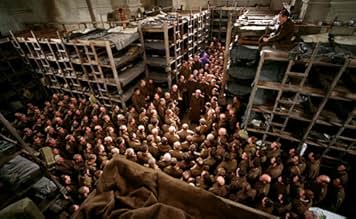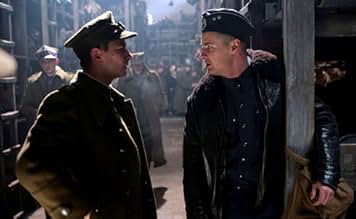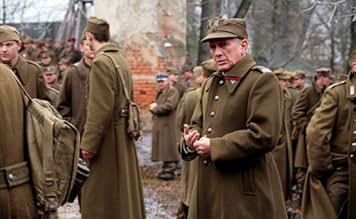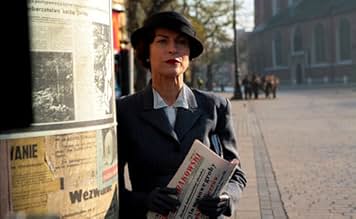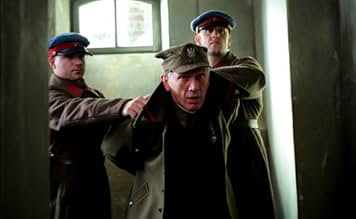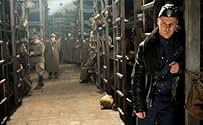An examination of the Soviet slaughter of thousands of Polish officers and citizens in the Katyn forest in 1940.An examination of the Soviet slaughter of thousands of Polish officers and citizens in the Katyn forest in 1940.An examination of the Soviet slaughter of thousands of Polish officers and citizens in the Katyn forest in 1940.
- Nominated for 1 Oscar
- 14 wins & 14 nominations total
Joachim Paul Assböck
- Obersturmbannführer Bruno Müller
- (as Joachim Assböck)
Featured reviews
Katyn by Andrzej Wajda
A courageous film by a director who makes no concessions. Austerity instead of high-tech. What cineast of hallucinatory action, of nude and crude sensuality, of sequences full of monumental catastrophes would make a film in which one had scenes in a slower rhythm, without sex, with shadowy photography, with quiet music and giving ethical principles priority over the characters and their lives.
One more reason, however, for us to thank Hollywood for nominating this film to run for the Oscar for the best foreign film.
The Katyn massacre, perpetrated on Stalin's orders to eliminate the fine flower of the Polish intelligentsia, was left out of official Soviet history until the glasnost of Gorbatchov. There, in the Katyn forest and in other places as well, thousands of Polish officers were massacred. The Soviets tried to attribute it to the Nazis, but the truth eventually came to light. There is still, however, in Russia today, an attempt to deny the historical truth.
I would like to make my own the reading of the film which focuses on this question of the distortion of historical fact by the apparatus of the state. The official lie imposed by the Soviet occupation of Poland brought torment to the lives of many of the families of the victims. Wajda's denunciation, along with the cry "Never kill again!" can also serve as an alert for our present world, in which so often a virtual reality becomes a substitute for the truth.
The first group of interpretations belong to the women (wives, mothers, daughters) of the dead officers: how they coped, first with the hope of their return, and then with the definitive notice of their loss. They are marvellous interpretations, revealing the director's mastery and the talent of the actors. The portrayals demonstrate how, even when nothing else is left, there is still dignity. The wife of the dead General in Katyn refuses to endorse a declaration, prepared by the Nazis, denouncing the Soviets. The truth was known why, then, should she play Hitler's propaganda game? He was just as much the enemy as Stalin was. Another woman wants to honour the memory of her brother by putting on the family tomb a stone with his name on it. Courageously she challenges the regime, but in vain - the stone is destroyed because on it the date of the officer's death indicates clearly who is to blame.
Most of the male characters were simply victims of massacre; among those who had the opportunity of showing themselves authentically noble was a Russian officer who tried to save his Polish neighbour and her daughter. "I couldn't save my own family but I can help yours." And it is a Polish officer who has changed sides who represents, in the middle of so much heroism, the weakness of some. "It is necessary to survive," he declared.
An entire population was suffocated by the Nazi and Soviet occupation. It is a shock to be shown in the film the cordial relations between the officials of the occupying powers, which would have been inconceivable in earlier years. Poland is partitioned (yet again!) by the Molotov-Ribbentrop pact. In the Poland occupied by the Nazis all the professors of a university are summoned and arrested there and then (as a means of impeding the formation of future opposition). In the Poland occupied by the Soviets, the Polish officers are made prisoners of war (an efficient means of stopping them fighting for the independence of their country).
Pawel Edelman's photography is simply a work of genius, a mixture of sombre realism and the surreal. The music of Krzystof Penderecki fits the narrative like a glove, producing just the right atmosphere at the right time. The dry narrative style has something in common with a documentary and calls to mind another of his films, Love in Germany. And there is no lack of the symbolism present in all his films, this time with a remarkably religious tone.
In the development of the story there are moments taken from the films of that period as, for example, the powerful exhumation of the dead, scenes which served Soviets and Nazis alike in placing the blame on each other.
For me the strongest images are those of the young man who refused to declare that his father had not been killed in Katyn by the Soviets; of the two waves of fugitives running in opposite directions and meeting in the middle of a bridge which way to run? of the general who tried to animate his men in the last Christmas of their lives and of the little girl awaiting the return of her father. This last touched me in a special way, because I too had waited for my father's return at the end of the war.
Katyn is, without doubt, one of Andrzej Wajda's greatest films.
Tomasz Lychowski Rio de Janeiro, Brazil February, 2008.
Translated into English by Graham Connell
A courageous film by a director who makes no concessions. Austerity instead of high-tech. What cineast of hallucinatory action, of nude and crude sensuality, of sequences full of monumental catastrophes would make a film in which one had scenes in a slower rhythm, without sex, with shadowy photography, with quiet music and giving ethical principles priority over the characters and their lives.
One more reason, however, for us to thank Hollywood for nominating this film to run for the Oscar for the best foreign film.
The Katyn massacre, perpetrated on Stalin's orders to eliminate the fine flower of the Polish intelligentsia, was left out of official Soviet history until the glasnost of Gorbatchov. There, in the Katyn forest and in other places as well, thousands of Polish officers were massacred. The Soviets tried to attribute it to the Nazis, but the truth eventually came to light. There is still, however, in Russia today, an attempt to deny the historical truth.
I would like to make my own the reading of the film which focuses on this question of the distortion of historical fact by the apparatus of the state. The official lie imposed by the Soviet occupation of Poland brought torment to the lives of many of the families of the victims. Wajda's denunciation, along with the cry "Never kill again!" can also serve as an alert for our present world, in which so often a virtual reality becomes a substitute for the truth.
The first group of interpretations belong to the women (wives, mothers, daughters) of the dead officers: how they coped, first with the hope of their return, and then with the definitive notice of their loss. They are marvellous interpretations, revealing the director's mastery and the talent of the actors. The portrayals demonstrate how, even when nothing else is left, there is still dignity. The wife of the dead General in Katyn refuses to endorse a declaration, prepared by the Nazis, denouncing the Soviets. The truth was known why, then, should she play Hitler's propaganda game? He was just as much the enemy as Stalin was. Another woman wants to honour the memory of her brother by putting on the family tomb a stone with his name on it. Courageously she challenges the regime, but in vain - the stone is destroyed because on it the date of the officer's death indicates clearly who is to blame.
Most of the male characters were simply victims of massacre; among those who had the opportunity of showing themselves authentically noble was a Russian officer who tried to save his Polish neighbour and her daughter. "I couldn't save my own family but I can help yours." And it is a Polish officer who has changed sides who represents, in the middle of so much heroism, the weakness of some. "It is necessary to survive," he declared.
An entire population was suffocated by the Nazi and Soviet occupation. It is a shock to be shown in the film the cordial relations between the officials of the occupying powers, which would have been inconceivable in earlier years. Poland is partitioned (yet again!) by the Molotov-Ribbentrop pact. In the Poland occupied by the Nazis all the professors of a university are summoned and arrested there and then (as a means of impeding the formation of future opposition). In the Poland occupied by the Soviets, the Polish officers are made prisoners of war (an efficient means of stopping them fighting for the independence of their country).
Pawel Edelman's photography is simply a work of genius, a mixture of sombre realism and the surreal. The music of Krzystof Penderecki fits the narrative like a glove, producing just the right atmosphere at the right time. The dry narrative style has something in common with a documentary and calls to mind another of his films, Love in Germany. And there is no lack of the symbolism present in all his films, this time with a remarkably religious tone.
In the development of the story there are moments taken from the films of that period as, for example, the powerful exhumation of the dead, scenes which served Soviets and Nazis alike in placing the blame on each other.
For me the strongest images are those of the young man who refused to declare that his father had not been killed in Katyn by the Soviets; of the two waves of fugitives running in opposite directions and meeting in the middle of a bridge which way to run? of the general who tried to animate his men in the last Christmas of their lives and of the little girl awaiting the return of her father. This last touched me in a special way, because I too had waited for my father's return at the end of the war.
Katyn is, without doubt, one of Andrzej Wajda's greatest films.
Tomasz Lychowski Rio de Janeiro, Brazil February, 2008.
Translated into English by Graham Connell
A well done picture speaking for those who cannot speak for themselves and would be gladly considered never existing by some.
Although it's difficult to credibly and adequately convey the horror of such a murder which became a life tragedy for many Polish families and undoubtedly affected the way Poland looked after the war I think the director made a good job. Especially so, that it happened to be his personal tragedy as well.
Despite that the movie is well-balanced with emotions and atmosphere. Modest colors and anxious music by Penderecki emphasize the horror of those who were waiting. Short cuts of brutal scenes of murder leave speechless. No additional comment is needed.
Although it's difficult to credibly and adequately convey the horror of such a murder which became a life tragedy for many Polish families and undoubtedly affected the way Poland looked after the war I think the director made a good job. Especially so, that it happened to be his personal tragedy as well.
Despite that the movie is well-balanced with emotions and atmosphere. Modest colors and anxious music by Penderecki emphasize the horror of those who were waiting. Short cuts of brutal scenes of murder leave speechless. No additional comment is needed.
I watched "Katyn" on a home computer screen. Even in that limited format, "Katyn" had an impact on me comparable to such cinematic greats as "Lawrence of Arabia." I cried throughout most of the film. I resolved that many of my relationships would be different. I remembered people I had known who reminded me of characters in the movie. After the film ended, I felt that I could not listen to the radio or read the newspaper or listen to anyone speak. I just needed to allow the film to sink into me.
Naysayers have critiqued "Katyn" as boring and dull. If you need a film to depict war, occupation, and atrocity as shiny, compact, and compelling as a sports car, then you should listen to those naysayers; don't watch "Katyn," rather, watch the very silly, teen fanboy-friendly Quentin Tarantino flic, "Inglorious Bastards." If you've seen enough Hollywood productions jam-packed with sexy Nazis and happy endings, and you want to take in a film that dares to depict, in eyeblinks, what war, atrocity, and occupation looked like and felt like to real people, then by all means see "Katyn." One of the many features that I admired: "Katyn"'s Nazis are not sexy. They are not Tom Cruise, Liam Neeson, Christoph Waltz. "Katyn"'s Nazis are brutal, repugnant thugs.
I respect this movie. There are too few movies about which I'd say that. It shows the courage not to attempt to weave an uplifting, feel-good atrocity narrative that leaves the viewer with a smile. This isn't "Schindler's List." "Schindler's List" is a very good movie, but this isn't that. It is, rather, very much like what World War Two and the subsequent Soviet occupation sounded like to me when I listened to my own older friends and relatives, who lived through both. This is disjointed narrative, stories that seem headed for redemption or even ecstasy but that end in random death, that end in aborted normalcy, aborted joy, aborted meaning. I felt, in watching these cold, pale, stoic characters, as if I were, once again, sitting across the table from older Eastern European friends and relatives. Yes, that's what they looked like. Yes, those are the facial expressions they assumed when they talked about the uncle who was rounded up and never heard from again, the daring, handsome lad who ended up in a mass grave – or when they pointedly did *not* talk about these people. The gravestone whose inscription dares to tell the truth; the tearing down of a propaganda poster; the Red Army soldier who struggles to do the right thing by a widow, who won't yet admit that she is a widow; the singing of exactly the right Christmas carol at exactly the right moment: those are exactly the heroic gestures that no one ever saw, that went unrecorded, that only one person lived to tell about, to tell me. Here they are, on screen.
When a movie is named "Katyn" the viewer knows how it will end; it's kind of like a movie named "Auschwitz" or "Kolyma" or "Wounded Knee." There isn't going to be a surprise ending. I was still surprised by the ending, by how courageous and moving I found it. Once again, Andrzej Wajda managed to wow the film-goer in me. And he managed to move the human in me.
See "Katyn." See a movie you can respect, a movie that is worth your time.
Naysayers have critiqued "Katyn" as boring and dull. If you need a film to depict war, occupation, and atrocity as shiny, compact, and compelling as a sports car, then you should listen to those naysayers; don't watch "Katyn," rather, watch the very silly, teen fanboy-friendly Quentin Tarantino flic, "Inglorious Bastards." If you've seen enough Hollywood productions jam-packed with sexy Nazis and happy endings, and you want to take in a film that dares to depict, in eyeblinks, what war, atrocity, and occupation looked like and felt like to real people, then by all means see "Katyn." One of the many features that I admired: "Katyn"'s Nazis are not sexy. They are not Tom Cruise, Liam Neeson, Christoph Waltz. "Katyn"'s Nazis are brutal, repugnant thugs.
I respect this movie. There are too few movies about which I'd say that. It shows the courage not to attempt to weave an uplifting, feel-good atrocity narrative that leaves the viewer with a smile. This isn't "Schindler's List." "Schindler's List" is a very good movie, but this isn't that. It is, rather, very much like what World War Two and the subsequent Soviet occupation sounded like to me when I listened to my own older friends and relatives, who lived through both. This is disjointed narrative, stories that seem headed for redemption or even ecstasy but that end in random death, that end in aborted normalcy, aborted joy, aborted meaning. I felt, in watching these cold, pale, stoic characters, as if I were, once again, sitting across the table from older Eastern European friends and relatives. Yes, that's what they looked like. Yes, those are the facial expressions they assumed when they talked about the uncle who was rounded up and never heard from again, the daring, handsome lad who ended up in a mass grave – or when they pointedly did *not* talk about these people. The gravestone whose inscription dares to tell the truth; the tearing down of a propaganda poster; the Red Army soldier who struggles to do the right thing by a widow, who won't yet admit that she is a widow; the singing of exactly the right Christmas carol at exactly the right moment: those are exactly the heroic gestures that no one ever saw, that went unrecorded, that only one person lived to tell about, to tell me. Here they are, on screen.
When a movie is named "Katyn" the viewer knows how it will end; it's kind of like a movie named "Auschwitz" or "Kolyma" or "Wounded Knee." There isn't going to be a surprise ending. I was still surprised by the ending, by how courageous and moving I found it. Once again, Andrzej Wajda managed to wow the film-goer in me. And he managed to move the human in me.
See "Katyn." See a movie you can respect, a movie that is worth your time.
Everyone in Poland has heard of the Katyn massacre but I've been surprised and saddened at how few people in Britain know of the atrocity. In the early part of the Second World War, more than 4,000 Polish soldiers were executed in the Katyn forest near Smolensk in western Russia. This was part of an organised effort to eradicate the military, political and intellectual leadership of Poland and a series of executions in various other locations removed some 22,000 Poles from their loved ones and their nation.
So, who did this? The Germans claimed to have uncovered the bodies in 1943 and blamed the Soviets in an effort to embarrass and divide the Allies. The Soviet Union categorically denied the crime at the time and for decades afterwards, only in 1990 admitting what the Poles and any independent assessor of the evidence knew: Stalin's NKVD perpetrated the horror on his express command.
The incident has now been made into a major Polish film by the acclaimed Polish director Andrzej Wajda whose own father was killed at Katyn and who is now in his 80s. The work was premiered at the Berlin film festival in 2007; it was nominated for the Academy Award for Best Foreign Film in 2008; and it finally arrived in Britain in a few cinemas in the summer of 2009. It is an exceptional work - both powerful and moving - that deserves a much larger audience.
Starting in 1939 with the simultaneous invasion of Poland by the Nazis and the Soviets, it takes us in several jumps to the immediate post-war period and underlines that the shame of Katyn was not just the deaths of the 22,000 in 1940 but the denial of the truth by so many people for so many years afterwards. Through the device of a prolonged flashback, the film concludes with a return to Katyn with close-up scenes of the sheer brutality of what was unquestionably a war crime.
The film is based on a novel by Andrzej Mularczyk and revolves around a number of fictional families with a fair bit of location work in Krakow, a city centre that looks today much like it did in the 1940s and which I have visited. The photography and acting are both excellent and selective use of wartime film footage simply adds to the sense of verisimilitude.
Footnote: To my utter astonishment, at the Renoir cinema in central London where I saw the film, as I descended the stairs to the screen, I was given a leaflet by a representation of something called The Stalin Society which insisted that the massacre was carried out by the Germans in 1943 and that Wajda's film is simply part of a sustained attempt to discredit communism at a time of economic crisis when so many people would see it as the obvious alternative to capitalism.
So, who did this? The Germans claimed to have uncovered the bodies in 1943 and blamed the Soviets in an effort to embarrass and divide the Allies. The Soviet Union categorically denied the crime at the time and for decades afterwards, only in 1990 admitting what the Poles and any independent assessor of the evidence knew: Stalin's NKVD perpetrated the horror on his express command.
The incident has now been made into a major Polish film by the acclaimed Polish director Andrzej Wajda whose own father was killed at Katyn and who is now in his 80s. The work was premiered at the Berlin film festival in 2007; it was nominated for the Academy Award for Best Foreign Film in 2008; and it finally arrived in Britain in a few cinemas in the summer of 2009. It is an exceptional work - both powerful and moving - that deserves a much larger audience.
Starting in 1939 with the simultaneous invasion of Poland by the Nazis and the Soviets, it takes us in several jumps to the immediate post-war period and underlines that the shame of Katyn was not just the deaths of the 22,000 in 1940 but the denial of the truth by so many people for so many years afterwards. Through the device of a prolonged flashback, the film concludes with a return to Katyn with close-up scenes of the sheer brutality of what was unquestionably a war crime.
The film is based on a novel by Andrzej Mularczyk and revolves around a number of fictional families with a fair bit of location work in Krakow, a city centre that looks today much like it did in the 1940s and which I have visited. The photography and acting are both excellent and selective use of wartime film footage simply adds to the sense of verisimilitude.
Footnote: To my utter astonishment, at the Renoir cinema in central London where I saw the film, as I descended the stairs to the screen, I was given a leaflet by a representation of something called The Stalin Society which insisted that the massacre was carried out by the Germans in 1943 and that Wajda's film is simply part of a sustained attempt to discredit communism at a time of economic crisis when so many people would see it as the obvious alternative to capitalism.
KATYN is one of the most powerful World War II films I have ever seen and from the first frame of Poles fleeing from the Germans to the rear and the Russians in the front, an audience immediately feels the horror and claustrophobia of attempting to flee from the enemy, but with a sense of absolutely no where to run. The cast is simply superb, the story one of Polish Officers who meet their fate at the hands of the enemy, but with a sense of pride in themselves and their families, and the men and women who struggled to deal with both the Germans and the Russians and survive, is one written in the annals of history, but now with the truth of the slaughter finally brought to light. The final scenes in KATYN sent me from the theater with a sense of wanting to get a deep breath of air in my lungs, and to attempt to digest the horror I had just seen on the screen. KATYN deserves the Oscar and it is a film that will haunt you forever.
Did you know
- TriviaThe director's father was killed in this massacre. Andrzej Wajda was only 13 years old then. His father's remains were never found.
- GoofsTur says to Ewa, "Haven't you seen that Disney's "The Sleeping Beauty", remember?" That movie was first released fourteen years after 1945, so this may be a mistranslation in the subtitles for "Snow White".
- ConnectionsFeatured in The 80th Annual Academy Awards (2008)
- SoundtracksPolish Requiem For 4 Solo Voices, Choir And Orchestra
Written by Krzysztof Penderecki
Performed by Polish State Philharmonic Orchestra
- How long is Katyn?Powered by Alexa
Details
- Release date
- Country of origin
- Official site
- Languages
- Also known as
- Катинь
- Filming locations
- Production companies
- See more company credits at IMDbPro
Box office
- Budget
- €4,000,000 (estimated)
- Gross US & Canada
- $118,095
- Opening weekend US & Canada
- $11,053
- Feb 22, 2009
- Gross worldwide
- $14,768,451
- Runtime
- 2h 2m(122 min)
- Color
- Sound mix
- Aspect ratio
- 2.35 : 1
Contribute to this page
Suggest an edit or add missing content

